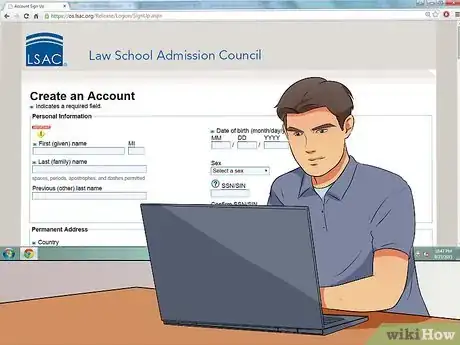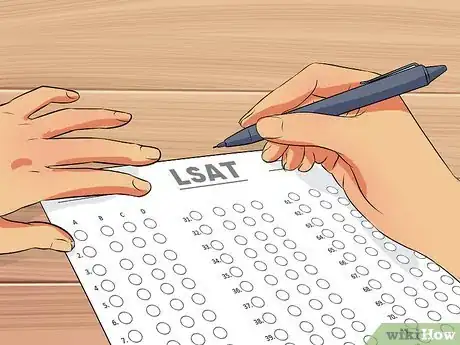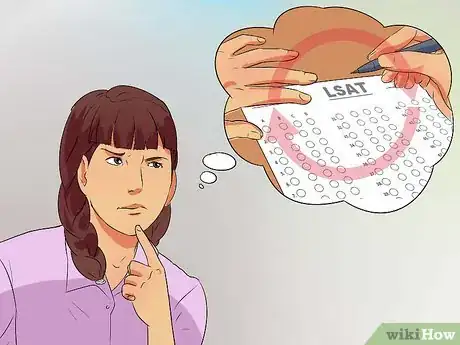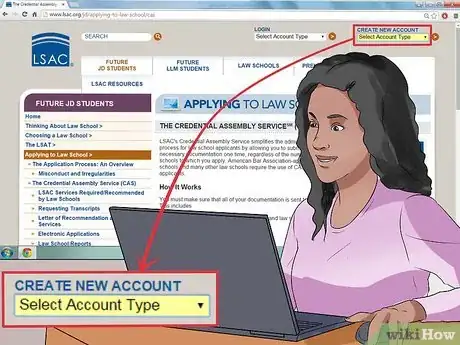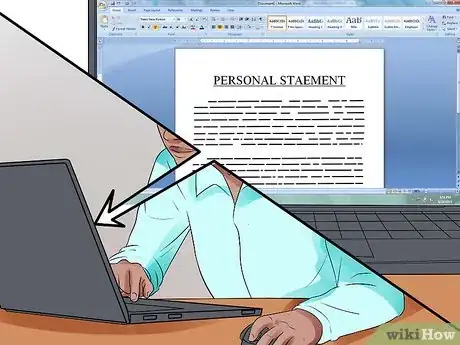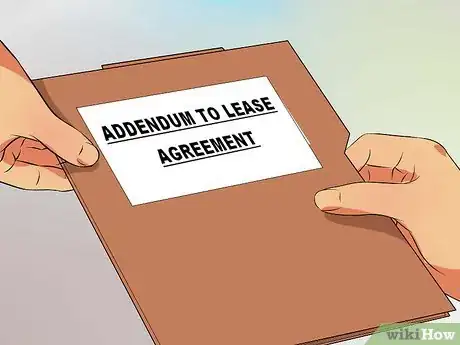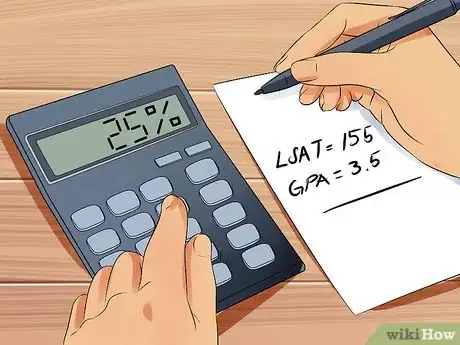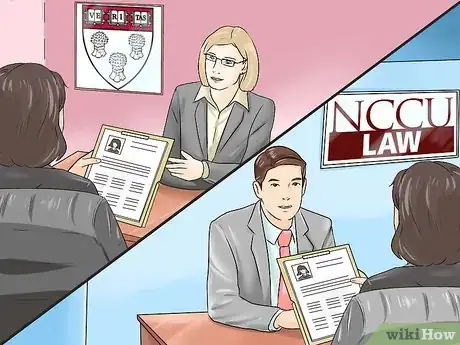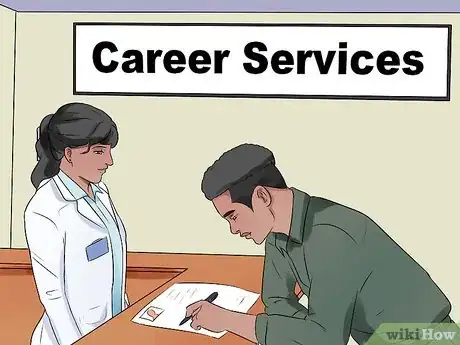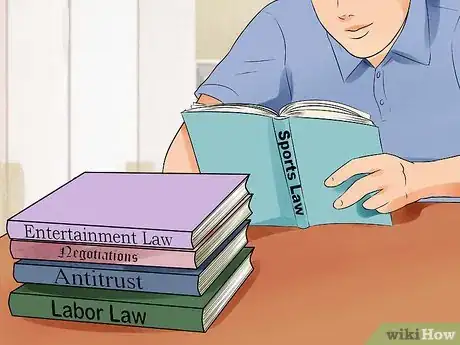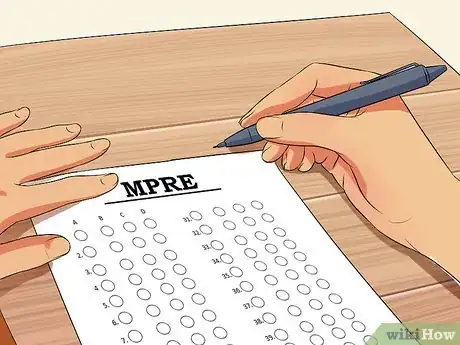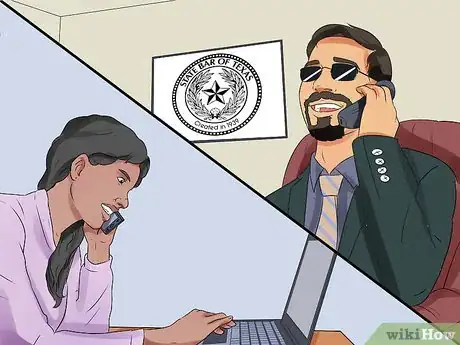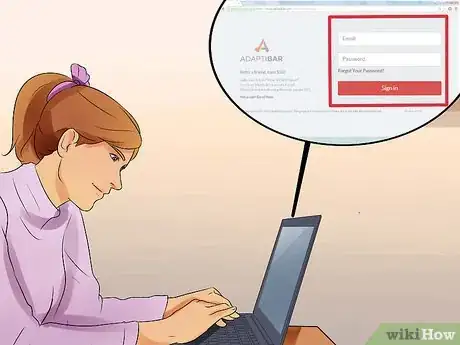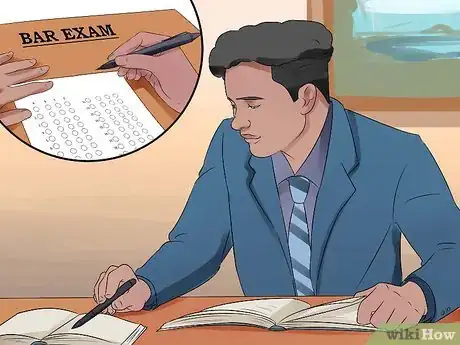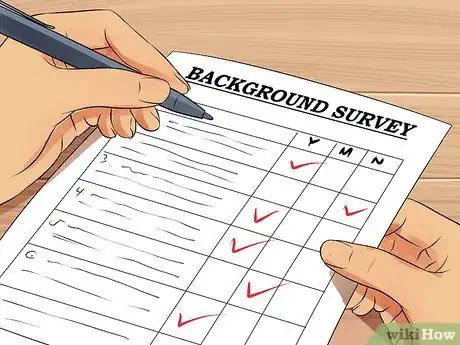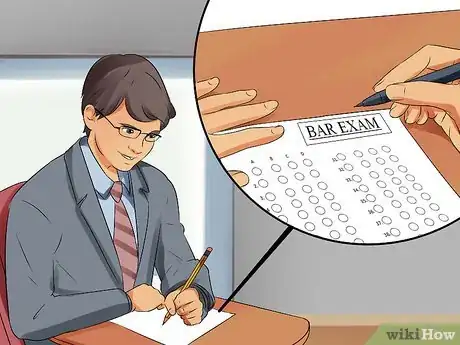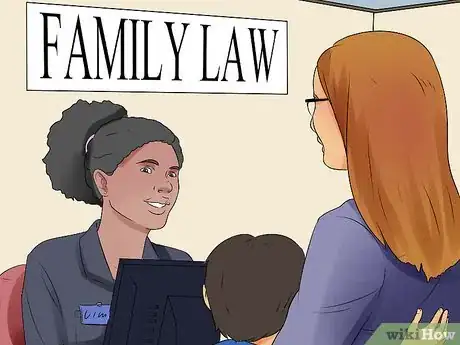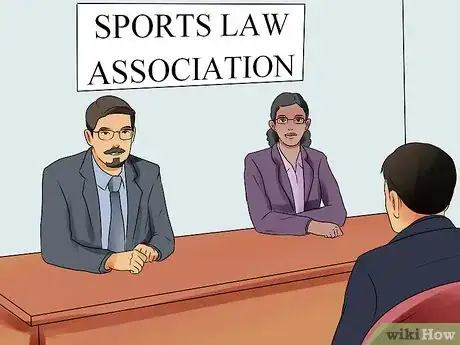This article was co-authored by Clinton M. Sandvick, JD, PhD. Clinton M. Sandvick worked as a civil litigator in California for over 7 years. He received his JD from the University of Wisconsin-Madison in 1998 and his PhD in American History from the University of Oregon in 2013.
There are 24 references cited in this article, which can be found at the bottom of the page.
This article has been viewed 95,402 times.
Do you enjoy sports? Can you negotiate a deal and work with high powered, successful people in pressure situations involving not only your career, but someone else's? Then consider working as a sports lawyer. Sports attorneys represent athletes and teams in negotiations and contract disputes, as well as in a variety of other situations. To become a sports attorney, you will need a law degree and a bar license.
Steps
Qualifying for Law School
-
1Earn an undergraduate degree. To apply to law school you will need a four-year bachelor's degree. You can get the degree in any subject, but make sure that you study something that you are passionate about, so that you can earn top grades. As a hopeful sports attorney, you may want to get a business degree, to help you understand the financial aspects of any team or athlete you represent in the future.
- Only attend an accredited undergraduate institution. For a listing of accredited schools, check the U.S. Department of Education's (“DOE”) Database of Accredited Postsecondary Institutions and Programs.
-
2Practice public speaking. The most critical skill you can have as an attorney is the confidence to speak to anyone, often with little preparation. Sports attorneys sometimes appear in court, addressing judges and juries, but they also speak in front of a variety audiences, including business owners, athletes, arbitrators, and corporate representatives.
- You should begin to develop public speaking skills while in college. Join debate or public speaking clubs, or act as a tour guide for the school.
- At the same time that you build your public speaking skills, don't forget to improve your writing and research skills. Upper-level classes that require you to write long research papers are good preparation for a career in law.
Advertisement -
3Get top grades. Not everyone gets into law school—especially those with a low grade point average (GPA). To increase your chances of getting in, graduate with at least a 3.0. Of course, a higher GPA is even better. Admissions counselors interpret a high GPA as proof that you are a hard worker who is self-motivated.[1]
- The higher your undergraduate GPA, the more selective you can be about what schools to apply to. Even if you do not care about the rank of the law school you attend, a higher GPA makes scholarships easier to get.
-
4Become a teaching assistant. To apply to law school, you will need to submit several letters of recommendation. They can be from professors or employers. The strongest letters will be written by people familiar with your work habits and temperament. Therefore, try to get to know faculty well.
- To build relationships with faculty, look for opportunities to work as a teaching assistant or as a research assistant.
-
5Intern with a sports attorney. The best way to see what a sports attorney's career is like is to work for one. If you have time during college, try to intern or work part-time for a sports attorney.
- Sports attorneys might not advertise jobs with your school. To get a job, search the internet for sports attorneys in your area. Then you can draft a resume and send an email to the attorney, asking if an internship or part-time job is available.
- Part-time work is a great way to get a reference from someone practicing in the field. You might also earn some money on the side.
Applying to Law School
-
1Consider how much you want to be a lawyer. Do you like working long hours for demanding bosses? That is what the legal profession is really like. Before you invest time and money applying to law school, you should consider how much you want to be a lawyer. Although law used to have a reputation as a stable, high-paying profession, the legal field has changed dramatically. Now newly minted attorneys often struggle to find enough part-time legal work to pay their bills.
- You should consider how comfortable you are working in a different area of law. Should you not get a job as a sports attorney, you may end up doing criminal defense, real estate, or family law. You may also have a general practice, with representing athletes making up only a small fraction of your practice. If this type of career path does not appeal to you, then you might not want to go to law school.
- In the same vein, you should think about how you will pay for law school. Students now pay over $30,000 a year in tuition alone, which does not include additional costs for living expenses.[2] If you are not careful, you could graduate law school $200,000 in debt and unhappy performing the only kinds of legal work that is available.
-
2Register for the Law School Admission Test (LSAT). The LSAT is offered four times a year, in June, September, December, and February. It is offered on Saturdays, but there are special sessions for those who observe a Saturday Sabbath.[3]
- Create a free account at the Law School Admission Counsel's (“LSAC”) website.
- Find a test date and location. To do this, start on LSAC's Law School Admission Counsel's website Dates and Deadlines page.
-
3Study for the LSAT. The LSAT is the most important part of your law school application. It tests reading comprehension, analytical reasoning, and logical reasoning.[4] The test is scored on a 120-180 scale, with 180 being the highest score.
- You can study for the exam using a commercial test prep company, which can charge over $1,000 for a study course. Or you can study on your own, by using older exams.
- Old exams are sold individually (and in packets) online. Your local or school library may also have old exams.
- Take your practice exams under timed conditions, just as you will take them on exam day. Doing so will perfect your ability to answer questions quickly and accurately.
-
4Take the LSAT. The LSAT has five multiple choice sections and one unscored essay. Four of the five multiple choice sections count toward your score. The fifth is experimental and does not count toward your score. The experimental section is not disclosed to you.
- Be sure to follow the rules. If you violate any rule on test day, then you will prevented from taking the exam.
-
5Think about retaking the exam. You can take the exam more than one time. Each school will decide how to treat more than one score. Some schools may take the higher score only, while other schools may average the two.
- On average, test takers are able to increase their score only two to three points on a re-take.[5] You should hesitate taking the exam a second time unless your score is far below what you were scoring on your practice exams. Two low scores could look worse than one.
-
6Create an account with the Credential Assembly Service (CAS). All law schools use CAS. You send them your required transcripts, letters of recommendation, and evaluation, and they in turn create a packet that is sent to schools.[6]
- Get any outstanding documents to CAS as soon as possible. Schools will not move forward with your application unless they have a complete packet.
-
7Ask for letters of recommendation. No law school application is complete without letters of recommendation. You should ask the faculty you worked for if they can write you a strong letter of recommendation. If the professor hesitates in any way, then move on and ask a different professor.
- Employers also make good recommenders. Ask a sports attorney you worked for if he or she would write a letter of recommendation. Getting a letter from someone in the field can help make your application look stronger.
- Some recommenders may need to be reminded to get their letters in on time. Be sure to give each professor (or employer) several months to complete the letter.
-
8Write your personal statement. Law schools require that you write a short statement, typically on a topic of your choosing. The statement is usually only 500 words, or roughly two double-spaced pages.[7]
- Always follow the directions and observe limits, especially word limits. If you go over, the school may disregard the extra material. Showing that you can follow rules is critical for your success in the admissions process.
- You might be given permission to write on any topic you want. Try to pick a topic that you feel comfortable about. Often short anecdotes make vivid writing samples.
-
9Write an addendum, if necessary. If you have criminal convictions, student code violations (e.g., cheating or plagiarism), or semesters with very low grades, then you should consider writing an addendum. Meet with your pre-law advisor and talk about whether you should write one and what you should say. A solid addendum will provide context for any information that might raise “red flags.”[8]
- You shouldn't make excuses in your addendum. If you had to drop out of college for a few years because of an addiction, then be honest about that and clarify what you learned about the experience. If you were caught cheating, then explain for the admissions committee how you now understand cheating is wrong and what steps you have taken so that you won't be tempted to cheat again.
Comparing Law Schools
-
1Gather information on job placement statistics. Always request job placement data from any law school you are thinking of attending. Over the past few years, a sea change has occurred with respect to the way schools collect job placement data. Schools provide much more detailed data on the jobs their graduates get.
- Most importantly, look at the number of students who get “full-time jobs requiring a JD” after graduation. Full-time jobs requiring a J.D. are the hardest jobs to get. Other statistics will include people who get part-time work, or people working full-time in a non-law field.
- Law schools probably don't keep statistics about the number of graduates who practice sports law, so you can't really differentiate schools on the basis of the number of graduates who practice in this field. However, you should search online for sports attorneys and see what schools they attended.
-
2Consider location. Only a handful of law schools have national reach. Instead, most law schools place their graduates in the local legal community, usually in small firms or local government agencies. You should therefore pick a law school in an area where you want to practice.
-
3Compare costs. As you compare law schools, you should always have costs in the forefront of your mind. You might assume that public schools are always cheaper than private schools, but that is not always the case. The tuition for out-of-state law students is often comparable to the tuition of a private school.
- If you want to move to a state and hope to qualify as an in-state resident, contact the law school's admissions office for information.
-
4Find schools with relevant clinics. A great way to get hands-on legal experience while in law school is to participate in a clinic. Unfortunately, there aren't many sports law clinics in the nation. Harvard and Valparaiso each have one,[9] [10] and Marquette and a few other schools have sports law institutes.[11]
- In the Valparaiso sports law clinic, students represent individuals involved in amateur sports (whether as a coach, athlete, or trainer) who have a legal issue arising out of their sports-related role.[12] Students work under a faculty advisor to represent clients in disputes involving doping, stipends from national sports authorities, and collegiate eligibility.[13]
- You can also look to take other clinics that will help you develop relevant skills. For example, a clinic on negotiations would help you begin learning how to negotiate on behalf of a client. Negotiation and Conflict Resolution Centers exist at a variety of law schools: Harvard, Northwestern, and William Mitchell each have one.[14]
- In a negotiation clinic, students work in teams under the supervision of a faculty member and represent clients involved in disputes. Students help the client resolve the dispute, but also assist clients in conducting conflict assessment and designing dispute resolution systems.[15]
-
5Use a calculator to gauge your chances at different schools. Law school admissions is a function of basically two numbers: your GPA and your LSAT. With those two numbers, you can safely judge what schools will admit you and which will reject you.
- You can gauge your likelihood of gaining admission to specific schools by using the LSAC calculator. Enter your undergraduate GPA and LSAT score to see your chances at different schools.
- If you have a 3.5 GPA and a 155 LSAT, then you have a 25% chance of getting into Arizona State, a 50% chance of getting into Michigan State, and a 75% chance of getting into the University of Miami.
- If you have a 3.65 and a 170 LSAT, then you have about a 50% chance of getting into Cornell and a 65% chance of getting into the University of Texas.
-
6Apply to multiple law schools. Applying to more than one school increases your chances of being accepted. Apply to several schools where your LSAT and GPA put you near the school's 75% median. You will have a strong chance of being admitted to those schools.
Earning your J.D.
-
1Take required courses. Law schools generally require about 90 credits, spread out over 3 years. Your first year will consist mostly of basic courses: torts, contracts, property, civil procedure, criminal law, and constitutional law.
- Most sports attorneys work in large law firms.[16] Accordingly, you will need to do very well in your 1L classes in order to be competitive for a job at a large law firm. The largest firms often come onto campus to interview students for 2L summer associate positions.
- Ask Career Services for a list of firms that come onto your campus. Career Services should also have information on the GPA required to be hired by these larger firms. Gathering this information can give you some idea of how well you need to do in your studies.
-
2Strive to get high grades. Your grades are important, especially for a first-time job. If you want to work at a large law firm, then you will need top grades—preferably at the very top of your class. Though the importance of grades decreases over time, poor grades could keep you locked out of jobs, at least initially.[17]
-
3Take appropriate electives. After you complete required foundation classes, you can spend the last two years of law school taking mostly whatever courses interest you. As a future sports attorney, you will want to take courses such as sports law, entertainment law, negotiations, antitrust, and labor law.[18] These fields are important for sports attorneys.
-
4Join the Sports Lawyers Association (SLA). You should join the SLA or other sports and entertainment law committees sponsored by your local or state bar association while in law school. Participate as actively as you can by serving on committees, writing articles, or whatever they will let you do.
- Participation in sports law organizations will help you meet people in the field, make contacts, and learn more about what you want to do when you graduate.
-
5Look for internships. While in law school you may want to try and intern for a law firm or a sports organization, such as a governing body (like the NFL or NCAA) or a professional sports team. You should contact your school's Career Services office and ask about available internship opportunities. Internships often can be taken for credit.
-
6Work during the summer for a sports lawyer. In your spring semester of law school, start searching for summer jobs. Larger firms will advertise through your school's career center. However, you can also send out a copy of your resume and transcript to smaller firms and ask if a position is available. Find an attorney who practices sports law and ask if he or she is looking for summer help.
- Approach all summer jobs seriously. Don't expect to be paid much. Instead, look for experience. In particular, you will want to get writing experience. When you apply for a job, employers typically ask for a writing sample. It is better to have a motion or a brief drafted for a real client than a writing assignment you did for a legal writing class in law school.
- View your summer job as a chance to build your reputation. Once you graduate law school, you might not have a job. However, your summer employer might remember you, especially if you did top-notch work. If so, you can hit up your former employers for contract work to tide you over until something full-time opens up.
-
7Pass the MPRE. The Multistate Professional Responsibility Examination is required to practice in all but three jurisdictions in the United States. The exam has 60 questions and tests your knowledge of legal ethics.[19] You will take the exam in your third year of law school.
Getting Admitted to the Bar
-
1Apply to a state bar. Once you decide on what state you wish to practice in, you should contact that state bar. Each state admits its own attorneys to practice.[20] The state bar will provide you with a list of the necessary steps to take.
-
2Register for the bar exam. Virtually every state requires that you pass a written exam. The exam typically includes an essay portion as well as a multiple choice test.[21]
- The bar exam is typically offered twice a year—once during the summer (June or July) and once during the winter (usually February). If you have to take the bar exam over, you have to pay each time you take it.
-
3Prepare for the bar exam. To prepare for the bar exam, you can take a commercial prep course. These courses last several months and prepare you for both the essay and multiple choice portions of the bar exam. They can be pricey; some prep courses can run up to several thousand dollars.[22]
- You can prepare more cheaply by purchasing old study guides published by the bar prep companies. Old copies can be found on eBay, Amazon, or other online retailers.
-
4Complete the background survey. In addition to passing the bar exam, you also need to pass a “character and fitness” review.[23] To initiate the review, fill out a detailed survey on your background: where you have lived, worked, and attended school. The survey will also ask about criminal convictions and arrests, as well as any financial difficulties you might have had.
- Give yourself plenty of time to fill out this survey. It must be filled out completely and honestly. Often the attempt to hide something is worse than the offense in the first place, so disclose everything.
- Common problems with character and fitness include criminal convictions, financial irresponsibility (such as bankruptcy), and accusations of plagiarism. These may not completely block you from admission, but be prepared to discuss them with the character and fitness committee.
-
5Take the bar examination. The bar exam is typically held over the course of 2 days. The first day consists of a multiple-choice exam covering topics such as contracts, constitutional law, criminal law, evidence, and torts.[24] The second day, consisting of essays, is often state-specific.[25]
- Typically, you will not receive your score for several months. In Illinois, for example, those who take the exam in July will not receive their results until the first two weeks of October.[26]
Starting as a Sports Lawyer
-
1Participate in On Campus Interviews (OCI). Because most sports lawyers work in larger firms, you should plan on participating in OCI. During OCI, large and medium-sized law firms come onto campus to interview students for potential summer associate positions. If hired, you will work for a few months during the summer before your 3L year. If the firm likes you, then it will extend an offer to join the firm after you graduate.
- Your Career Services office will send out detailed requirements for participating in OCI, such as preparing a resume and ordering copies of your transcript. Be sure to follow all policies to the letter, otherwise you could be prohibited from participating in interviews.
- As you research what firms you want to bid on, look at this list of the “best” sports law firms. Though all “best of” lists should be taken with a grain of salt, this list will point you in the direction of law firms with healthy sports law practices.
-
2Search online for job postings. If you did not get a summer associate position (or if no offer was extended to join after graduation), then you will have to search for jobs during your 3L year and after you take the bar. Your Career Services department should keep a listing of jobs. You also will have to look online. Most jobs are now posted online, at various sites:
- Indeed.com. This website aggregates job postings from other websites, such as Monster. You should search by city and search for both “lawyer” and “attorney.”
- Craigslist. Lawyers often post job openings to Craigslist. Often, you are requested to send a resume and writing sample.
- State bar association. Your state's bar association may have a jobs bank or a bulletin board where jobs are posted.
-
3Set up informational interviews. After taking the bar exam, you should identify attorneys whose sports law practices you would like to learn more about. Draft a letter (not an email) and introduce yourself. Be sure to mention who gave you their name.
- In the letter, explicitly state that you are not asking for a job. You will get a better response this way.
- Develop a list of questions (at least five) and take notes. Be engaged.[27]
- Ask the attorney if she knows anyone else you can talk to, and be sure to send a thank you note afterwards.
-
4Reach out to former employers. If you cannot find a job after passing the bar, re-connect with attorneys you worked for during the summer or part-time during the school year. They may have overflow work for you to do, such as research assignments, court appointments, or briefing. They may also be looking to hire a part-time or full-time lawyer.
- You can also cold call other sports lawyers and ask if they have any overflow work. If you do not have a job, you should be most focused on building your reputation and not be picky about how much you get paid. If you do good work for low wages (or even for free), then the attorney may come back to you with additional work.
-
5Get a first job. Even if sports law is your dream, you might need to take another legal job simply to pay the bills. You might have to find a job as a transactional attorney, an insurance claims adjuster, or work as a legal research assistant. Alternately, you might have to take a job doing criminal defense or family law.
- As you advance in your career, you can expand your practice to incorporate sports-related litigation or deals.
-
6Stay connected to the sports law community. To stay up-to-date on sports law, you should think about joining a law association. The Sports Lawyer Association is a non-profit organization made up of over 1,000 sports lawyers.[28] It provides education resources for those practicing in the field.
References
- ↑ http://www.usnews.com/education/blogs/law-admissions-lowdown/2012/11/12/learn-the-5-deciding-factors-in-law-school-admissions
- ↑ http://www.washingtonpost.com/blogs/wonkblog/wp/2013/07/18/ignore-the-haters-law-school-is-totally-worth-the-cash/
- ↑ http://www.lsac.org/jd/lsat/test-dates-deadlines
- ↑ http://www.lsac.org/jd/lsat/about-the-lsat/
- ↑ http://prelaw.umass.edu/topics/lsat_retake
- ↑ http://www.lsac.org/jd/applying-to-law-school/cas
- ↑ http://www.law.uci.edu/admission/apply/
- ↑ http://www.usnews.com/education/blogs/law-admissions-lowdown/2014/06/30/when-how-to-write-a-law-school-addendum
- ↑ http://hls.harvard.edu/dept/clinical/clinics/sports-law-clinic/
- ↑ http://www.valpo.edu/law/current-students/sports-law-clinic
- ↑ https://law.marquette.edu/national-sports-law-institute/welcome
- ↑ http://www.valpo.edu/law/current-students/sports-law-clinic
- ↑ https://www.youtube.com/watch?v=xJjiN0U3JXA
- ↑ http://www.law.northwestern.edu/legalclinic/negotiations/
- ↑ http://hls.harvard.edu/dept/clinical/clinics/harvard-negotiation-and-mediation-clinic/
- ↑ http://www.huffingtonpost.com/roger-i-abrams/how-to-become-a-sports-la_b_5024038.html
- ↑ http://www.law.umich.edu/connection/a2z/Lists/Posts/Post.aspx?ID=89
- ↑ http://www.huffingtonpost.com/roger-i-abrams/how-to-become-a-sports-la_b_5024038.html
- ↑ http://www.ncbex.org/exams/mpre/
- ↑ http://www.americanbar.org/groups/legal_education/resources/bar_admissions/basic_overview.html
- ↑ http://www.adaptibar.com/what-is-the-bar-exam.aspx
- ↑ http://www.nationaljurist.com/content/guide-bar-review-courses
- ↑ http://www.michbar.org/file/professional/pdfs/unraveling.pdf
- ↑ https://www.ilbaradmissions.org/appinfo.action?id=1
- ↑ http://www.adaptibar.com/what-is-the-bar-exam.aspx
- ↑ https://www.ilbaradmissions.org/appinfo.action?id=1
- ↑ http://www.forbes.com/sites/jacquelynsmith/2013/12/11/how-to-land-and-ace-an-informational-interview/2/
- ↑ http://www.sportslaw.org/about/mission.cfm






